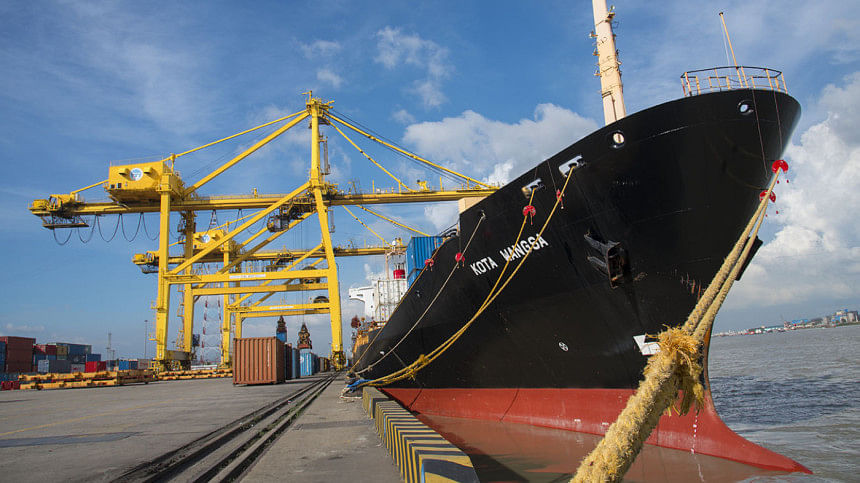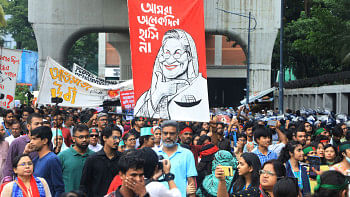Breathing room for exporters, but concerns persist

The 20 percent US tariff on Bangladesh's exports offers an opportunity for the country to diversify its export markets, said industry insiders yesterday.
They believe that the revised rate would enable them to compete with countries like Vietnam, a close rival in the American market.
Some exporters, however, have voiced concern.
The reactions come as the US slashed its tariff rate on goods from Bangladesh from the previous 35 percent, after a final round of intense negotiations followed high-level discussions between Bangladeshi officials and the Office of the United States Trade Representative in Washington.
Exporters were deeply concerned about losing competitiveness in the US market, the single biggest destination for Bangladesh's goods, after the Trump administration announced a 35 percent tariff, albeit lower than the initial plan of 37 percent, which would be added to the existing average of around 16 percent.
"While the revised rate is 20 percent on Bangladesh's exports to the US, it could raise the effective duty to as high as 35 percent in some cases," said AK Azad, chairman and managing director of Ha-Meem Group, a leading exporter to the US.
Still, we remain competitive. With India facing a higher duty, some US orders may shift towards Bangladesh... Negotiation pressure from buyers is expected. The industry must act collectively and strategically to handle this.
"Still, we remain competitive. With India facing a higher duty, some US orders may shift towards Bangladesh."
He added that the 20 percent duty is not uniform across all goods.
"Many of our exports fall under lower tariffs, but there's concern that buyers may use this hike to pressure us for price reductions. Negotiation pressure from buyers is expected. The industry must act collectively and strategically to handle this."
Azad, a former president of the Federation of Bangladesh Chambers of Commerce and Industry (FBCCI), said that since Vietnam faces similar tariffs in the US market, there is no added competition from their side.
But Cambodia and Indonesia face 19 percent tariffs in the American market, placing Bangladesh at a mildly disadvantageous position.
"There's still scope for negotiation," he said, "Government efforts must continue, and trade bodies can play a key role. Even a one percent tariff reduction could significantly ease pressure on exporters."
Though we'll not face intense competition from Vietnam, US buyers will try to pass the extra burden of the tariff on to us. Middle and small manufacturers will face a significant challenge to retain US buyers as they will bargain for a price cut.
"We must remain cautious," he said, mentioning that India is in talks for a reduction from the 25 percent tariff.
Pakistan, having access to local raw materials, enjoys a 19 percent tariff. This will increase its competitiveness."
Anwar-Ul-Alam Chowdhury (Parvez), president of the Bangladesh Chamber of Industries, said, "Though we'll not face intense competitive pressure from our competitors from Vietnam, US buyers will try to pass the extra burden of the tariff on to us. Middle and small manufacturers will face a significant challenge to retain US buyers as they will bargain for a price cut."
He expressed concern that prices of imported goods would rise in America due to the new tariff, leading to a decline in consumer demand.
"So, the volume of orders from US buyers will fall," added Parvez, who is also a former president of the Bangladesh Garment Manufacturers and Exporters Association.Riad Mahmud, managing director of N Poly, a non-leather shoe exporter to the US market, said, "We expect that orders which have been put on hold by buyers will come back, as the tariff rate remains the same as that of our main competitor, Vietnam. But I assume that US buyers will bargain for a price reduction in a way that we absorb part of the tariff burden," he added.
Our buyers are under pressure and are asking us for more concessions. We need to work wisely, not just by offering low prices, but by providing excellent service and maintaining strong, trustworthy relationships.
"Ultimately, US customers will suffer. They will have to spend extra because of the import tariff," he said.
Asif Ibrahim, former president of the Dhaka Chamber of Commerce and Industry (DCCI), said the final 20 percent tariff imposed by the US on Bangladeshi exports, following three rounds of negotiations, offers much-needed breathing space for the country's exporters.
He said that while the tariff presents challenges, it also opens the door to recalibrate and chart a path for strategic growth.
"As global competition heats up, Bangladesh now has the chance to diversify its export markets and upgrade its value proposition."
He said the tariff may act as a catalyst, accelerating the shift towards higher-value, sustainable apparel production and enhanced industry standards. By investing in efficiency, technology, and design, the readymade garment (RMG) sector can retain its edge in a rapidly evolving global landscape.
"With the right strategy and bold initiatives, this could be a turning point, transforming Bangladesh into a more agile, innovative, and globally respected sourcing hub," he added.
Ahsan Khan Chowdhury, chairman and CEO of Pran-RFL Group, expressed concern that the 20 percent tariff will directly impact the group's exports to the US.
He cited a recent conversation with a US buyer and added that the buyer reportedly asked the company to absorb part of the tariffs by lowering export prices.
"This is quite challenging for us," he said. "We operate on very thin margins, and as a developing country, we have limited financial resources. But we still need to hold our ground in the US market."
He termed the move a "step backwards for global trade," adding, "Tariffs like these don't just hurt us but disrupt the entire global trade ecosystem."
"The burden of this tariff will ultimately fall on American consumers. Prices will go up, and it will become increasingly difficult for middle-class families in the US to bear the cost."
Chowdhury emphasised the need for consistent engagement with the US market.
"The battle isn't over yet. Tariffs change over time, and we need to stay alert to seize any opportunity that comes our way."
"We must continue working proactively with American stakeholders, build stable trade relations, and look for ways to reduce our production costs in order to remain competitive."
"Our buyers are under pressure and are asking us for more concessions. We need to work wisely, not just by offering low prices, but by providing excellent service and maintaining strong, trustworthy relationships."

 For all latest news, follow The Daily Star's Google News channel.
For all latest news, follow The Daily Star's Google News channel. 



Comments